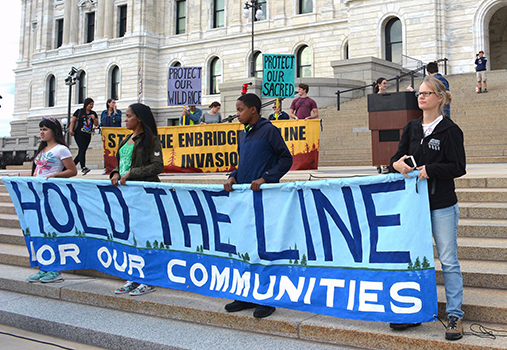Efforts to restrict freedom of assembly have gained steam in this new legislative session. Since the start of the new year, bills have been introduced almost daily; in fact, just one month into the legislative session, more than 34 bills have already been introduced in 19 states. Not only have these bills become more numerous, they have also become more expansive—barring protest at additional sites and including new groups, such as high school students, who would find their rights curtailed.
The Piper Fund’s pooled rapid response fund, Protecting the Right to Protest, is currently making our first set of grants for 2019, to support coalition-building and public education about the importance of freedom of assembly. Separately, Piper Action Fund is supporting grassroots and direct lobbying to defeat the most harmful of these bills. Together, we are coordinating the Protect Dissent Network, through which national organizations are collaborating to provide legal, strategic, and communications support to state coalitions.
Here are the trends that have emerged around the most common types of bills so far this year:
Bills Criminalizing Protests Against Pipelines

In states where communities are protesting pipeline development, “Critical Infrastructure Bills” create exorbitant penalties for protests and civil liabilities against the organizations that support them. Already this year, six bills have been introduced in Illinois, Indiana, Mississippi, Missouri, North Dakota, and Wyoming. Fortunately, the Wyoming bill recently died in the House, largely thanks to the outrage generated by a similar bill debated last year. The others remain active, however, and based on statements from legislators, we anticipate the introduction of additional bills in the coming weeks in at least two more states.
A troubling development this year is that several bills not only prohibit activity at sites of existing pipelines, but also at locations where pipelines and other infrastructure projects are under construction. The inclusion of construction sites vastly expands the reach of these bills to target protests at locations where facilities ranging from oil refineries to cell phone towers have yet to be built.
Bills Targeting Student Protest
“Campus Free Speech Bills”, which restrict student protest, have already been introduced in ten states. These bills contain an array of provisions; the most troubling bills, currently under consideration in Arkansas, Iowa, Missouri, and South Carolina, would allow speakers to sue the university if they felt that student protestors had interfered with their speech. Such actions would likely encourage universities to clamp down on protest broadly in order to avoid the threat of lawsuits.
Here too, bills have been broadened to further quash freedom of assembly. In Arkansas, where two competing bills have been introduced, one version restricts protest by high school students and also creates criminal liability. Both are worrisome precedents that represent significant threats to the protest rights of youth.
Bills Targeting Protests That Block Streets
We have also witnessed bills that increase criminal penalties for blocking traffic, a common protest tactic for Black Lives Matter, as well as other movements. Although unsuccessful in 2018, bills were reintroduced in both Mississippi and Minnesota this year.
While these bills have in the past targeted groups that block highway traffic, the Mississippi bill was amended to include traffic on any roadway, drastically expanding the scope of the bill. While that bill did not make it past committee, we are monitoring the situation closely to see if this language appears in bills in other states.
The above represent only the three most common categories of anti-protest bills. Others, for example, strive to impose exorbitant fees for protesting at the state Capitol (Oklahoma), restrict the protest rights of teachers (Oklahoma), and prohibit face coverings during protest (Indiana, Oregon).
If you would like to learn more about Piper’s work to protect freedom of assembly, please don’t hesitate to reach out to our Program Director Melissa Spatz.